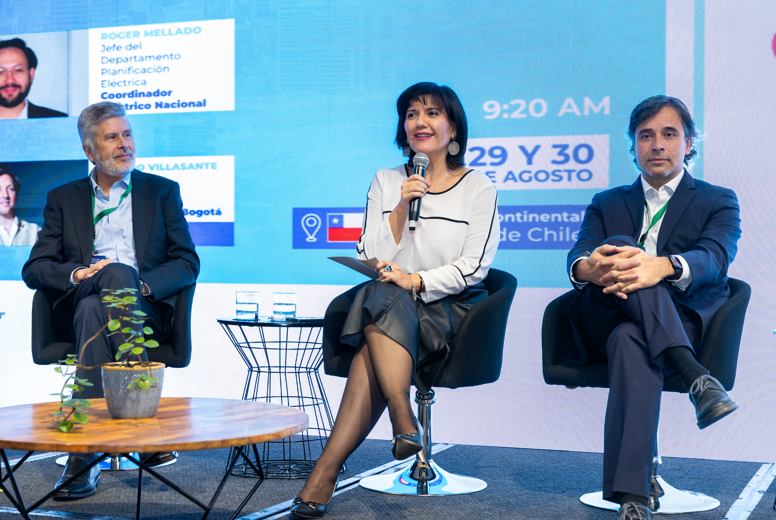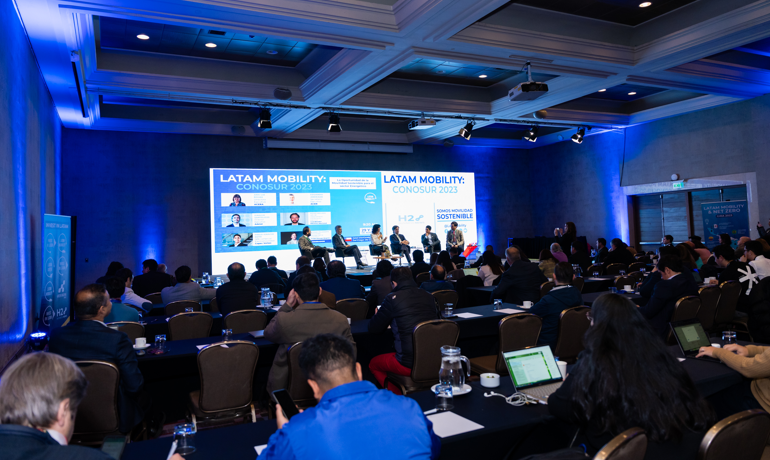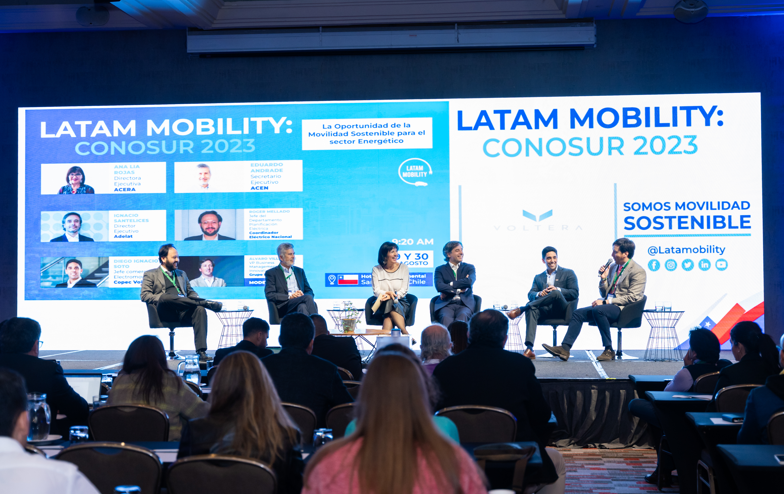“The Opportunity of Sustainable Mobility for the Energy Sector”, was part of the rich programmatic agenda of the “Latam Mobility: ConoSur 2023”, organized by Invest in Latam in Santiago, Chile.
Ana Lia Rojas, Executive Director of the Chilean Association of Renewable Energy and Storage (ACERA), said that they have 150 partners throughout the value chain made up of companies such as generators, developers, business platform for suppliers, which generate a very important ecosystem.
“The data kills the story,” said Rojas, noting that they exceed 50% in the use of non-conventional renewable energies in a market that is developing at an accelerated pace.
“There are still regulatory challenges. We have a deficit in the regulatory framework. Seeing the glass half full does not mean not talking about what is missing, such as distribution, which is why reforms are essential to reach the goal of reducing emissions,” she said.

ACEN and Grid Access
Eduardo Andrade, Executive Secretary of the Chilean Association of Energy Marketers (ACEN), said that they are made up of approximately 14 companies interested in acting in the delivery to the grid, buying energy and selling it to the system.
“Electromobility goes beyond the charger and transportation of energy, it requires the user to have adequate access to the grid, which is why it is necessary to modify the electric grid”.
Read also: Kapsch’s Free Flow Toll System Shows Great Technological Attributes for Mobility
He emphasized the need to make transformations to avoid obstacles in the transition and access to energy with competitive costs, seeking that, in the medium term, users can choose their renewable energy suppliers of choice.
“About 90% of the energy available in Brazil is being commercialized and they have financed more than 50% renewable energy, we want to reach that level in Chile. Electromobility is a set of parts of the system to contribute to the common goal of sustainability,” Andrade concluded.
Adelat and Value Chain
Ignacio Santelices Ruiz, Executive Director of the Association of Latin American Electric Energy Distributors (Adelat), pointed out that despite having been founded just over a year ago, it already has a presence in six countries in the region.
He assured that in order to develop renewable energies and electromobility, the solution is not enough; it is necessary to build an entire ecosystem so that Latin American cities are prepared for electric cars.
“Solar panels were developed without subsidies, and the same thing is happening in electromobility. It is key that private actors enter and the market opens up. In Chile we have the second highest rate of chargers per number of cars, more buses, when prices go down we are going to fill up with electric cars,” said Santelices.
“We have to move forward in distribution, the more we delay investments, the more costly they will be”, he emphasized.

Copec’s Transition
One of the companies with the longest tradition in the fuel industry, Copec, is undergoing a revolution to make the transition to electric mobility.
Diego Ignacio Soto Guerra, commercial head of Electromobility at Copec Voltex, explained the changes being developed in the company’s division focused on the electrification of transportation.
“We started to see these new technologies and we are dedicated to electric solutions with 1800 kilometers of road interconnected with electric chargers,” he specified.
He highlighted Copec Voltex’s leadership in the development of large-scale electroterminals such as the one located in Antofagasta. “Electromobility is the pillar of change, to achieve the transition we have to talk about the ecosystem, storage”.
Soto exposed the need to harness solar energy and see how to deliver it to buses and other vehicles through optimized charging for fleets charging. “Elements such as copper and lithium are fundamental, it is a great opportunity to develop the economy through sustainable mobility,” concluded the Copec Voltex executive.
Technical Planning
Roger Mellado, Head of the Electric Planning Department at the National Electric Coordinator, explained the importance of the system to promote and massify electric mobility.
“We are an independent technical entity of the national electricity system with a safe and economic operation that guarantees open access,” he said.
He explained that planning and technical preparation contributes to the sustainability of the electric system, to facilitate actions to integrate renewable energy.
“We have a roadmap for an accelerated energy transition. We propose milestones and activities such as studies to visualize the system towards 2030, with the possibility of having 100% renewable energy in the system. This is a great challenge,” stressed Mellado.
“Coordinating all these energies and enabling the transmission grid is a challenge,” he concluded.
The following is the second day of “Latam Mobility: ConoSur 2023“:




